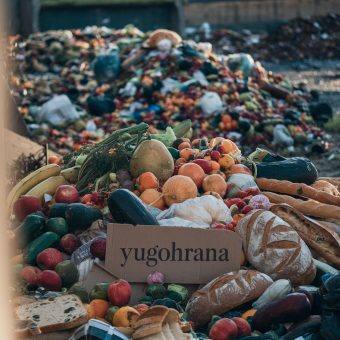Food waste has always sparked debate within human communities. While some had the privilege of surplus, often discarded without much thought, others strove through solidarity and sharing to ensure everyone could at least have a bite.
Today, however, food surplus has grown beyond a moral issue — it has become a severe environmental burden. Wasted food contributes to environmental pollution, squanders resources, and deepens inequality.

That is precisely why the YugoHrana platform was launched earlier this year — an innovative initiative that ensures food, instead of ending up as waste, finds its purpose and reaches those who need it most. The idea came from Tuzla, from Maid Huremović, who emphasizes that this innovative platform is a bridge between food that some would discard and people who can gratefully make use of it.
“I grew up with the warmth of the kitchen and the aroma of homemade meals that are not thrown away, but creatively transformed into something new. I drew inspiration from everyday scenes — half-empty bakery shelves, leftover food at the end of the day, and at the same time, the needs of people living modestly. YugoHrana is my way of connecting two realities that should never have been separated,” Huremović says.
The platform is designed so that its partners (bakeries, restaurants, stores) report food surpluses that would otherwise be thrown away at the end of the day, while users can reserve these meals via the app or website for symbolic prices and pick them up on site.
Although it’s still in its early stages, YugoHrana quickly captured people’s hearts, sparked widespread interest, and raised awareness.
“Now, not only do users recognize us, but also hospitality professionals, the media, and members of the community who want to be part of the change. The main goal of the platform is to prevent food waste and help that food find a new purpose — and along with it, people develop new habits,” says the platform’s founder, adding that this way, everyone benefits: food is saved, costs are reduced, and waste is eliminated.

The plan is for YugoHrana, as its name suggests, to soon take on a regional character and expand throughout the former Yugoslavia. Behind this ambitious plan lies nostalgia for better times, but also faith in the sense of connectedness, sharing, and empathy that characterizes the people of this region.
Our interviewee points out that people recognize the significance of this platform, and they are regularly meeting with potential partners across the region. Still, he admits that every beginning is difficult, but they are ready to face numerous challenges.
“What matters to us is that people are engaged in the process and understand the importance of change — a change we genuinely need. And that proves that the Balkans are ready to embrace change. Right now, we don’t measure success by numbers but by the depth of interest we receive — and it grows every day,” says Huremović.
IN FOCUS:
- A Global Standard for the Environmental Responsibility of the Cocoa Industry
- Two and a Half Decades of Fighting for a Clean Future
- Mushroom-Based Batteries – A Story of Applying Nature’s Cycle in Technology
When it comes to changing citizens’ awareness about food waste, Huremović believes that this change begins quietly, in every home. In the way we store leftovers, in the glance we give a full plate, and in the decision we make about what to do with that last piece of bread.
The founder of YugoHrana emphasizes that through education, positive examples, and concrete platforms like this one, we can shape habits. At the end of the interview for Energy Portal Magazine, Huremović called on restaurants, bakeries, shops, and food producers to join them in their mission to reduce food waste and build sustainable communities — because, as he says, “every town, every village has surplus it can share — and its people who will value it.”
An Ecological and Moral Issue
In a world that produces enough food for all eight billion people, it is paradoxical that around 2.5 billion tons of food are wasted annually, more than one-third of total production. Every day, approximately one billion meals are discarded in households worldwide.
At the same time, about 733 million people — nearly one in ten globally — face hunger. This mismatch between surplus and scarcity is not only morally unacceptable but also carries severe environmental consequences. Food waste is responsible for 8 to 10 percent of global greenhouse gas emissions.
Prepared by Jasna Dragojević
The story was published in Energy portal Magazine PURE ENERGY

